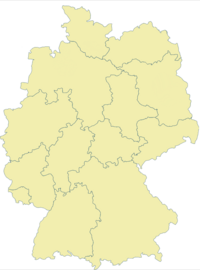Operation Burning Spirit
| Languages: | ||||||||||||||||||||||||||||||||||||||||||||||||||||||||||||||||||||||||||||||||||||
| ||||||||||||||||||||||||||||||||||||||||||||||||||||||||||||||||||||||||||||||||||||
| ||||||||||||||||
Operating Burning Spirit began on January 10, 2009 with resistance wars in North Rhine-Westphalia, Mecklenburg-Western Pomerania, Saxony, Lower Saxony and Bremen, Schleswig-Holstein and Hamburg, and Hesse.
Contents
History
After the German Independence War, Germany obtained control of 5 of its original territories. After two months and only one of the seven territories given back to Germany from Sweden, German and PEACE Global Community officials met to discuss plans of retaking the regions by force. The top-secret invasion was codenamed "Operation Burning Spirit."
Very few people knew about the plans and even most congressmen were left out, due to the possibility of the information getting back to Sweden. Prior to attacking, Germany bought out most weapons on the Swedish market with the SEK in their treasury and distributed them among the soldiers. Germany, Brazil, Italy, France, Indonesia, and Portugal then sent their troops to the target regions as Germany spent a total of about 450 gold to start the resistance wars.
Germany also created five "dummy articles" in Sweden to vote to the top rated section so that they would block out any news of a resistance war that Swedish newspaper owners would try to warn the Swedes about.
Battle for North Rhine-Westphalia
- Outcome - won by Germany
- Link - Battle of North Rhine-Westphalia
- Began - 10 January 2009
- Ended - 11 January 2009
- Started By - Diabolus1907
- Hero for Germany - Star4891(-5263)
- Hero for Sweden - Melkion (3259)
Battle for Mecklenburg-Western Pomerania
- Outcome - won by Germany
- Link - Battle of Mecklenburg-Western Pomerania
- Began - 10 January 2009
- Ended - 11 January 2009
- Started By - Vaclav
- Hero for Germany - Star4891(-2005)
- Hero for Sweden - ghishae(3284)
Battle for Saxony
- Outcome - won by Germany
- Link - Battle of Saxony
- Began - 10 January 2009
- Ended - 11 January 2009
- Started By - zocky
- Hero for Germany - BattalGazi(-2742)
- Hero for Sweden - Melkion(1939)
Battle for Lower Saxony and Bremen
- Outcome - won by Germany
- Link - Battle of Lower Saxony and Bremen
- Began - 10 January 2009
- Ended - 11 January 2009
- Started By - Matthieu Bonne
- Hero for Germany - Guibrit(-3091)
- Hero for Sweden - Melkion (2276)
Battle for Schleswig-Holstein and Hamburg
- Outcome - won by Germany
- Link - Battle of Schleswig-Holstein and Hamburg
- Began - 10 January 2009
- Ended - 11 January 2009
- Started By - Claussen
- Hero for Germany - darkplayer82(-16867)
- Hero for Sweden - st00r(14282)
Battle for Hesse
- Outcome - won by Germany
- Link - Battle of Hesse
- Began - 10 January 2009
- Ended - 11 January 2009
- Started By - Kieler
- Hero for Germany - serenity16(-2444)
- Hero for Sweden - Michael Collins(2542)

